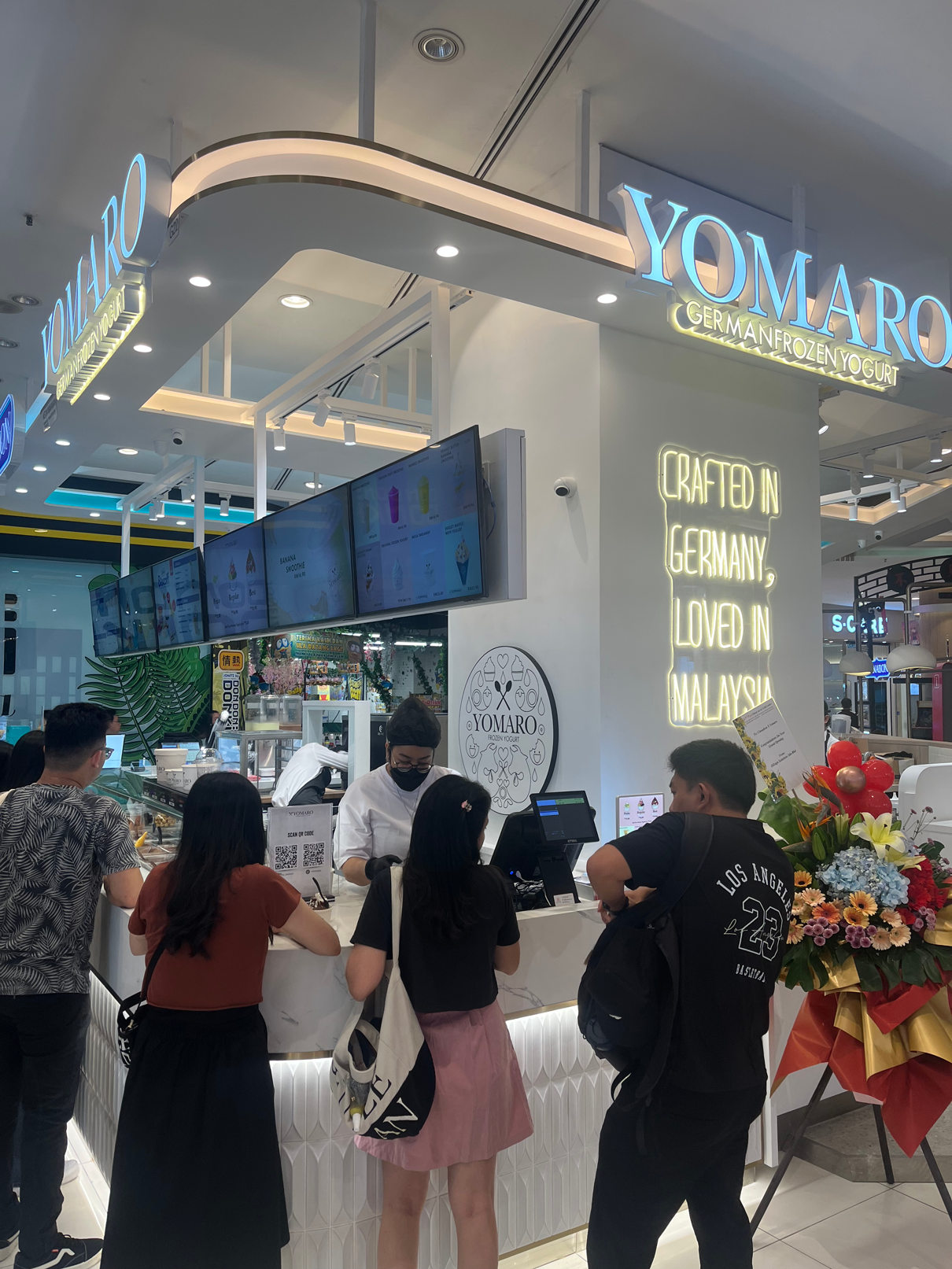FROM LOCAL ROOTS TO GLOBAL MARKETS
Taking steps towards internationalisation can present particular challenges for owner-managed and family-run companies. However, this can also present great opportunities. Here are two company stories.
Matthias Rombey opens Yomaro branches in Kuala Lumpur.
For Yomaro, Malaysia is the ideal test market in Asia.
‘I had a very secure job, with the prospect of becoming a civil servant. At 28, that might have been a good thing, but I decided against it. I took the plunge into self-employment.’ These are the words with which Matthias Rombey describes the birth of Yomaro. In 2012, he started selling frozen yoghurt from a small shop on Lorettostraße in Düsseldorf. It sold like hot cakes. Today, there are 22 branches across Europe, most of which are in Germany, with others in Mallorca and Luxembourg. Rombey describes this expansion as seizing opportunities as they arise. This approach is particularly well-suited to small, owner-managed companies that can make quick and bold decisions. The franchise system has enabled the company to grow relatively quickly without requiring significant capital investment.
Yomaro now has four shops in Malaysia and will open a fifth while this magazine is preparing for publication. An investor has secured the rights for the entire Asian market and is making significant progress. ‘Made in Germany is a real mark of quality in Malaysia,’ says Rombey.
‘Malaysia is an ideal test market.’ If the Kuala Lumpur branches are profitable, the plan is to continue expanding. 'Jakarta, Bali, Bangkok — if we think big, our goal is to cover every country east of Malaysia.' To achieve this, the founder will devote himself fully to the task next year. While his business partner of 13 years, Raphael Inhoven, manages the European business with a team of six, overseeing controlling and marketing activities, Rombey works as head of expansion in Asia. There, he helps set up shops and teams, adapt products and train employees. For Matthias Rombey, spending a year working in Asia is an investment in the future.
With its strong specialisation, the chemical company Schulz & Sohn GmbH is internationally successful.
Schulz & Sohn GmbH – a fourth-generation family business: Mark Sethe, CFO; Dr Klaus Vitalis Schulz, CEO
Schulz & Sohn is a company with a much longer history but equally local roots. The family business, which is now in its fourth generation, specialises in cleaning products in the B2B sector. The company began exporting in the 1990s. 'Our international expansion really took off in the 2010s, initially with private label projects in other European countries and later also overseas,' says Mark Sethe, CFO at Schulz & Sohn GmbH. The pandemic provided an additional boost, as international collaboration via Teams and Zoom suddenly became the norm. The company also created professional structures early on, including multilingual customer service and specialised supply chain partners. The organisation's internationalisation was further boosted by the introduction of an enterprise resource planning system that promotes digital collaboration. At the company's headquarters in Düsseldorf, however, little has changed in 135 years. As personal contact with customers and partners is important, regular international travel is essential. ‘This creates long-term connections based on trust, understanding, and genuine collaboration,’ explains Mark Sethe. These steps have paid off: since 2021, Schulz & Sohn has been the global market leader for coffee machine cleaners in the catering sector. ‘The combination of specialisation, quality and partnership is the key to our success.’ Sethe also considers a spirit of innovation, short decision-making processes and a strong team of 106 employees to be essential prerequisites.
What unites Schulz & Sohn and Yomaro, despite their differences, is the ability to make quick and courageous decisions, a consistent commitment to internationalisation, and a willingness to embrace change. Ralf Schlindwein is the Managing Director for International Affairs at the Düsseldorf Chamber of Industry and Commerce, which supports companies in expanding abroad. He sees the following advantages for owner-managed and family-run companies: ‘Decision-making processes are often shorter, as ownership and management are often in the same hands. At the same time, personal networks and trust play a greater role, and partnerships abroad are carefully examined and nurtured. Additionally, entrepreneurial risk is often linked to the family's assets, leading to particularly thorough preparation and planning.' These companies are also important players in the international economy. 'Their focus on niche markets and specialised solutions, as well as their high level of innovation and adaptability, is precisely what makes them so successful and in demand worldwide,' says Schlindwein. Nevertheless, there are more than enough challenges. Different countries have different customs, and in international business this manifests itself in the form of different requirements and complex regulations. Anyone who wants to be successful across borders needs employees with linguistic, intercultural, and legal expertise. For smaller companies in particular, this can be a real challenge. There are also general hurdles that currently affect more than just SMEs, such as local certification requirements, increased security requirements, sanctions, non-transparent legislation and higher customs duties. Companies can counter these issues by implementing a strategic internationalisation strategy.
Ralf Schlindwein advises, 'Instead of a "big bang", focus on gradual market entry. Family-run companies should carefully consider which markets are relevant for their products, and then plan their market entry accordingly.” Mark Sethe from Schulz & Sohn adds, 'Start with pilot markets, build stable partnerships, and invest in your teams' intercultural competence. Use digital tools to foster relationships even when working remotely. Above all, involve the team. Internationalisation is not just a project for management, but a joint endeavour.’ •
„Additionally, entrepreneurial risk is often linked to the family’s assets, leading to particularly thorough preparation and planning“
Words: Lisa Maria Kunst
Pictures: Matthias Rombay, Christian Köster




